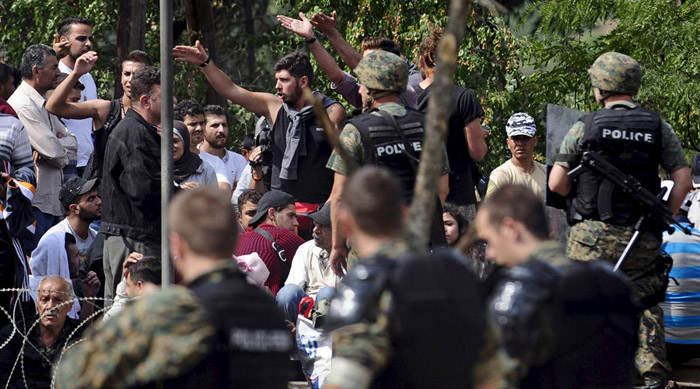The situation on the Greek eastern Aegean islands housing the so-called refugee “hotspots” has taken a dangerous turn, with racially motivated attacks on the rise. The European Union needs to act to head off a full-blown surge in anti-refugee rhetoric and violence.
In the latest major incident, in late November, suspected far-right extremists—allegedly with links to the neo-fascist Golden Dawn—and local residents attacked and intimidated refugees in the Souda camp on the island of Chios, causing injuries and panic. There have been other incidents, though on a smaller scale, on Chios and other Greek islands, as well as the mainland.
At the end of August, a previously unknown group calling itself the Lone Wolves of Radical, Autonomous, Militant National Socialism claimed responsibility for firebombing and destroying a squat in Athens. Over 100 asylum seekers and migrants, mostly families with children, living in the squat were thankfully unharmed.
Border closures along the Balkans route, the flawed EU-Turkey deal, and a lack of EU solidarity, including a poorly executed relocation plan, have combined to effectively strand over 58,000 people in Greece, a country still struggling with a deep economic crisis. The five main islands receiving asylum seekers and migrants are at double capacity, with more than 16,200 people contained in EU-sponsored hotspots in poor, volatile and severely overcrowded conditions while their claims are processed at a snail’s pace. In addition, those who arrived on the islands after March 20 are totally excluded from relocation elsewhere in EU countries, irrespective of their nationality.
Mismanagement and disconcerting changes on these island tourist destinations appear to be creating fertile ground for far-right extremism and anti-immigrant rhetoric. It feels a lot like Athens did five or six years ago, when the lack of official reception facilities left many asylum seekers and migrants homeless on the streets. At that time, intolerant political rhetoric, hostile government policies, and the failure to tackle head-on the phenomenon of racist violence created the political space for Golden Dawn’s anti-human-rights position to blossom.
Between 2010 and 2013, there was an alarming surge in racially motivated attacks on migrants and asylum seekers, with gangs of Greeks chasing foreigners down the streets and violently attacking people, including pregnant women and children, particularly in downtown Athens. Much of this mob violence went unrecorded and unpunished.
Over the past four years, Greek authorities have taken important steps to tackle hate crimes, including establishing specialized police units and appointing special hate crimes prosecutors in Athens and Thessaloniki. To encourage reporting of these incidents, the government introduced measures granting humanitarian visas to undocumented victims and witnesses of hate crimes. A 2014 anti-racism law increased minimum penalties for such crimes and improved the scope and application of racist motivation as an aggravating circumstance. Sixty-nine members of Golden Dawn are on trial for operating a criminal organization accused of dozens of violent racist attacks.
It is against that backdrop of clear repudiation of xenophobia that the Greek population has been largely generous and welcoming despite the challenges posed by the large numbers of asylum seekers and migrants, particularly on the islands.
There are worrying signs that this may be changing, however, and the Greek authorities should send a strong message that violence will not be tolerated, and that the police will hold those responsible to account. The government at the highest level should condemn these attacks, and create a public campaign on the island hotspots and refugee camps on the mainland to encourage reporting of hate crimes.
Police stations in areas with a high presence of refugees should have at least one officer with advanced specialized training in hate crimes, including racist and xenophobic violence, as well as experience with investigating extremist activities. The police should develop and disseminate specific guidelines for all officers working in the refugee context, including on the islands, for the investigation of hate crimes.
The EU and its member states have an important role to play. They should support Greece in ensuring the security and protection of asylum seekers and migrants inside the hotspots and improving conditions in the centers. The EU should also support measures to alleviate the pressure on the islands through transferring people to appropriate and humane housing on the mainland, and speeding up relocation to other EU countries, without excluding people stranded for months on the islands.
It would be a real scandal and a European shame if racist attacks in Greece were to pick up again.







Comments